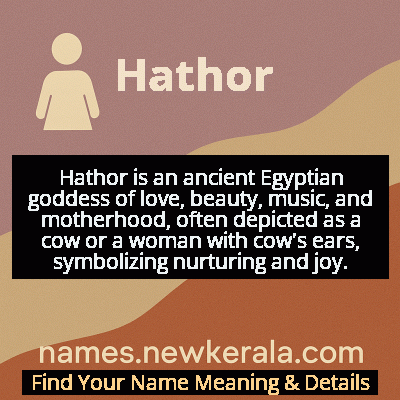Hathor Name Meaning & Details
Origin, Popularity, Numerology Analysis & Name Meaning of Hathor
Discover the origin, meaning, and cultural significance of the name HATHOR. Delve into its historical roots and explore the lasting impact it has had on communities and traditions.
Name
Hathor
Gender
Female
Origin
Egyptian
Lucky Number
7
Meaning of the Name - Hathor
Hathor is an ancient Egyptian goddess of love, beauty, music, and motherhood, often depicted as a cow or a woman with cow's ears, symbolizing nurturing and joy.
Hathor - Complete Numerology Analysis
Your Numerology Number
Based on Pythagorean Numerology System
Ruling Planet
Neptune (Ketu)
Positive Nature
Intuitive, analytical, spiritual, and inquisitive.
Negative Traits
Secretive, reserved, aloof, and can be overly critical.
Lucky Colours
Green, yellow.
Lucky Days
Monday.
Lucky Stones
Cat’s eye, moonstone.
Harmony Numbers
1, 5, 6.
Best Suited Professions
Scientists, researchers, spiritual leaders, detectives.
What People Like About You
Depth of knowledge, analytical skills, spirituality.
Famous People Named Hathor
Hathor (Mythological)
Egyptian Goddess
One of the most important Egyptian deities, worshipped as goddess of love, beauty, music, motherhood, and joy
Hathor (Historical Reference)
Temple Priestess
High priestess who served in Dendera Temple complex, center of Hathor worship
Hathor (Modern)
Academic Researcher
Egyptology scholar specializing in goddess worship and feminine divinity in ancient religions
Name Variations & International Equivalents
Click on blue names to explore their detailed meanings. Gray names with will be available soon.
Cultural & Historical Significance
Her worship centered at Dendera, where magnificent temples were built in her honor, featuring the famous Dendera zodiac and elaborate reliefs depicting her as a cow goddess or as a woman with cow's ears. Hathor represented the benevolent aspects of feminine power, contrasting with the more aggressive Sekhmet, who was considered her destructive counterpart. Her sevenfold nature represented different aspects of feminine energy, and her cult involved ecstatic music, dance, and ritual intoxication, making her one of the most beloved and accessible deities in the Egyptian pantheon.
Extended Personality Analysis
Individuals named Hathor are often perceived as embodying the goddess's multifaceted nature—they tend to be creative, artistic, and emotionally expressive, with a strong connection to beauty and aesthetics. Like the goddess who presided over music and dance, Hathors often have natural rhythm and artistic talent, thriving in environments that allow creative expression. They typically possess warm, nurturing personalities with strong maternal instincts, making them excellent caregivers and friends.
However, they also carry the goddess's dual nature—they can be fiercely protective when those they love are threatened, transforming from gentle nurturers into determined defenders. Their emotional depth allows them to connect deeply with others, but they may struggle with mood swings or intensity of feeling. Hathors often have a magnetic presence that draws people to them, much like the ancient goddess who was called 'the Golden One' for her radiant beauty and life-giving energy. This combination of artistic sensitivity and protective strength makes them both inspiring and reliable companions.
Modern Usage & Popularity
In contemporary times, Hathor remains a rare but meaningful choice for parents seeking names with mythological depth and feminine power. The name has seen a slight resurgence among families interested in Egyptian mythology, pagan traditions, or unique historical names. While not ranking in mainstream baby name lists, it appears occasionally in birth announcements, particularly among communities valuing ancient wisdom and goddess spirituality. Modern usage often emphasizes the goddess's aspects of love, creativity, and feminine strength rather than her destructive capabilities. The name appeals to parents looking for something distinctive yet historically grounded, with beautiful phonetic qualities and rich cultural associations. Its rarity ensures that any child named Hathor will have a unique identity while carrying the legacy of one of history's most celebrated goddesses, making it an empowering choice for the modern era.
Symbolic & Spiritual Meanings
Hathor symbolizes the complete spectrum of feminine energy—from gentle nurturer to fierce protector. She represents the harmony between creative and destructive forces, embodying the Egyptian concept of ma'at (cosmic balance). As the 'Eye of Ra,' she symbolizes both the protective and destructive aspects of divine power. Her cow imagery connects her to nourishment, motherhood, and the life-giving properties of nature. The sistrum, her sacred rattle, represents music's power to ward off evil and invoke joy. Hathor's symbolic meanings extend to transformation—she could shift from benevolent goddess to raging lioness, teaching that strength and gentleness are not opposites but complementary aspects of wholeness. Her association with turquoise and malachite connects her to protection and healing, while her role as mistress of the sycamore tree symbolizes shelter and sustenance for souls transitioning between worlds, making her a comprehensive symbol of life's cyclical nature.

